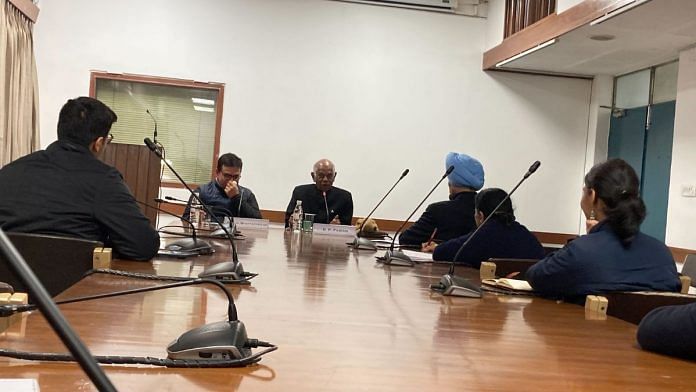New Delhi: On a cold Delhi evening, a small but captivated audience attempted to understand the hot diplomatic questions that have daunted India ever since eight of its Navy veterans were awarded the death penalty by a Qatari court in October. Two things emerged clearly at this gathering: the Gulf state’s growing clout in the Middle East and its profound implications for India.
The discussion, held at the India International Centre, saw a spirited exchange of questions and ideas. The topics ranged from Qatar’s regional rivalries to how the situation with India’s Navy veterans might influence India’s stance in the United Nations General Assembly, especially vis-à-vis the ongoing conflict in Gaza.
Kallol Bhattacherjee, author and senior assistant editor of foreign affairs at The Hindu, was a panellist at the discussion chaired by KP Fabian, former Indian ambassador to Qatar and currently a professor at Symbiosis University and the Indian Society of International Law.
Multiple questions from the audience focused on whether the case of the eight Navy veterans is being used as a bargaining chip by the government in Doha. It could, after all, help manipulate India’s position on crucial global issues in fora such as the UNGA or the International Court of Justice. The chair and panellist, however, were against giving much credit to this speculation. Given the opaqueness and complexities of the case, questions, theories and ideas will be the bedrock of any discussion here in India, they said.
Middle East rivalries
Bhattacharjee highlighted that the Middle East has seen intense rivalries and competition for over two decades, especially among Gulf Cooperation Council members such as Saudi Arabia, Qatar and the United Arab Emirates. This competition has led to the militarisation of the region, with each country vying to outdo the other with latest military equipment.
“The militarisation of the gulf started in 1999. The Kingdom of Saudi Arabia, Qatar and the UAE have been purchasing lots of military equipment since the end of the 1990s,” said Bhattacharjee, adding that these nations “are spending billions on military purchases, finding supporters from countries that produce and sell such equipment.”
This competition has prompted Qatar to expand its naval forces. The country has signed an agreement with Italian shipbuilding giant Fincantieri SpA for the production of high-tech submarines, which is part of a larger project involving the construction of a naval base and maintenance of its military fleet.
And this is where the story of the eight Indian veterans and Qatar intermingle. As reported by ThePrint in April 2023, intelligence sources revealed that the eight men were accused of spying on the oil-rich Gulf kingdom’s submarine programme and purportedly passing the information to Israel.
The personnel worked for a private firm – Dahra Global Technologies and Consultancy Services – and were contracted to provide training services to the Qatari Navy.
Qatar’s Court of First Instance issued a death sentence to the eight veterans on 26 October 2023, on charges that the prosecution hasn’t publicly disclosed to date. The sentence was commuted on 28 December 2023 after an application was lodged with the country’s Court of Appeal. Some of the convicted personnel received a life sentence, while others received a reduced sentence.
Also read: When George Bush ‘behaved like a little boy’ with Atal Bihari Vajpayee
Qatar’s design for regional power
Qatar is a small country, but it wields extreme influence in global politics, explained Bhattacherjee.
“While [Qatar] is small in size, it is not insignificant. It is powerful and extremely wealthy. It has a clear [diplomatic] design to maintain and showcase its power in the region,” he said. Qatar’s relationship with India is not static, added Bhattacharjee. “It is diplomatically very active and the relationship is constantly evolving.”
Despite strong economic ties between New Delhi and Doha and almost 7.5 lakh Indians living and working in Qatar, there does not exist a ratified agreement between the two governments with respect to the exchange of prisoners.
“There exists an agreement between India and Qatar on the exchange of prisoners, but it has not been ratified by the government of Qatar and therefore is not currently active,” said former ambassador Fabian.
The fate of the eight Navy veterans, thus, is in the hands of the Qatari judiciary.
The convicted personnel still have the option to appeal their sentences with the Court of Cassation – the highest judicial body in Qatar. If that fails, they can appeal to the Emir of Qatar for a pardon.
However, the Emir issues a pardon only twice a year – on Ramadan and the national day of Qatar on 18 December. While the country’s national day has just passed, Ramadan is about two months away in March, leaving a small window for the veterans to return to India.
(Edited by Zoya Bhatti)



